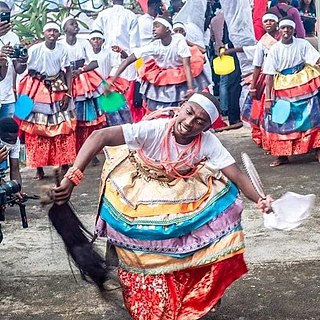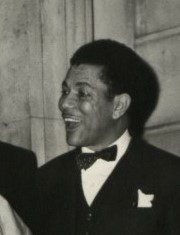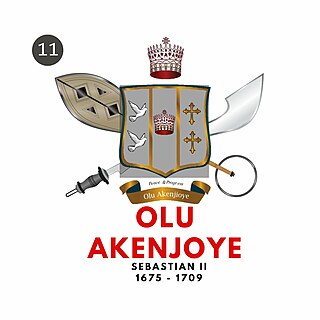
The Itsekiri are one of the fundamental Yoruba subgroups in Nigeria's Niger Delta area. They originate from Ile-Ife and speak a Yoruboid language and can be found in Ondo, Edo and Delta State. The Itsekiris presently transcends a population of over 1 million people and live mainly in parts of Ondo, Edo and majorly in the Warri South, Warri North and Warri South West local government districts of Delta State on the Atlantic coast of Nigeria.

Nana Olomu (1852–1916) was an Itsekiri chief and palm oil merchant from the Niger Delta region of southern Nigeria. He was the fourth Itsekiri chief to hold the position of Governor of Benin River.

Chief Arthur Edward Prest was an Itsekiri politician of biracial heritage from the Warri division of southern Nigeria.
The Warri Crisis was a series of conflicts in Delta State, Nigeria between 1997 and 2003 between the Itsekiri, the Ijaw ethnic groups. Over 200,000 people were displaced by the Warri conflict between 1999 and 2006. Over 700,000 people were displaced during this period by violence in Delta State overall.
The Itsekiri language is a major branch of the Yoruboid group of languages, which as a group, is a key member of the Volta–Niger sub-family of the Niger–Congo family of African languages. Itsekiri is spoken by nearly 900,000 people in Nigeria as a first language and by many others as an additional language notably in the Niger Delta and in parts of Edo and Ondo states of Nigeria. The other key members of the Yoruboid group are Yoruba and Igala along with the various Yoruba dialects spoken in Benin and Togo.

The Kingdom of Warri, Warri Kingdom or Iwere Kingdom, was established in 1480, was part of the Nigerian traditional states its ancestral capital is based in Ode-Itsekiri, Warri South LGA, Delta State, Nigeria with a palace erected in 1950s in the heart of the city of Warri, Warri South LGA, Delta State, Nigeria.

Chief Ayiri Emami is a Nigerian businessman, politician, and philanthropist, the Chairman and Chief Executive Officer of A & E group, a company with investments in oil and gas, construction, haulage, entertainment and the hospitality industry.

Erejuwa II was a Nigerian traditional title holder and paramount leader of the Itsekiri who was Olu of Warri from 1951 to 1964 and from 1966 to 1986. He was the 18th Olu of Warri Kingdom with the title Ogiame Erejuwa II. He succeeded his father Ginuwa II as Olu. Ginuwa II was a great grandson of Olu Akengbuwa the last Olu who died in 1848, he was crowned in 1936 after an interregnum that lasted 88 years when Warri's political leadership was dominated by merchant princes.

Olu Ginuwa was an Itsekiri king who was the first Olu of Warri. He was the eldest son of Oba Olua, the 14th Oba of Benin and Heir Apparent to the throne of the Great Benin Kingdom. He migrated from Benin Kingdom and was crowned the first Olu of Warri. He reigned for a period of 30 years. He reigned from 1480 to 1510. He was succeeded by his son, Olu Ijijen (Ogbowuru). Another of his sons, Olu Irame took over as king after Olu Ijijen joined his ancestors.

Olu Irame was a Nigerian traditional ruler who was the 3rd Olu of Warri. He was the second son to Olu Ginuwa and succeeded his brother Olu Ogbowuru as the 3rd Olu of Warri. It is stated that he banished the three gods and their worshipers from Ode-Itsekiri-Olu because of their incessant "noise-making". The gods and their worshipers moved to Orugbo, a community about 2 miles from Ode-Itsekiri-olu.

Olu Akenjoye was the 11th Olu of Warri who ruled over the Itsekiri and non Itsekiri people in the kingdom. He was the son to Olu Abejoye, the 10th Olu of Warri Kingdom. He succeeded his father as the 11th Olu of Warri. He took the title, Ogiame Sebastian II. He was succeeded by his son Olu Omagboye (Miguel).

Olu Omagboye was the 12th Olu of Warri who ruled over the Kingdom of Warri. He succeeded his father, Olu Akenjoye as the 12th Olu of Warri. He took the title, Ogiame Omagboye. His son Olu Akengboye succeeded him.

Olu Akengboye was the 13th Olu of Warri who ruled over the Kingdom of Warri. He succeeded his father, Olu Omagboye (Miguel) as the 13th Olu of Warri. He took the title, Ogiame Akengboye. His Portuguese name was Agostinho Sabastiao Octobia. His son Olu Atogbuwa succeeded him around 1734.

Olu Erejuwa was the 15th Olu of Warri who ruled over the Kingdom of Warri. He succeeded Olu Atogbuwa as the 15th Olu of Warri. He took the title, Ogiame Erejuwa I. His Portuguese name was Sebastiao Manuel Octobia. When he went to be with his fathers, he was succeeded by Olu Akengbuwa around 1795.

Olu Akengbuwa was the 16th Olu of Warri who ruled over the Kingdom of Warri. He succeeded his father Olu Erejuwa I as the 16th Olu of Warri. He took the title, Ogiame Akengbuwa. He was also called Eyeolusan Joao. When he went to be with his fathers, there was a period of crisis following the death to the potential successors which was followed by a period of political Interregnum. His son Prince Oritsemone left Ode-Itsekiri during the period of the crisis to form Usele Community.

Olu Atuwatse II was a Nigerian traditional title holder and paramount leader of the Itsekiri who was Olu of Warri from 1987 to 2015. He was the 19th Olu of Warri Kingdom with the title Ogiame Atuwatse II. He was born Godwin Toritseju Emiko. He succeeded his father Erejuwa II as the Olu of Warri. He was a lawyer by profession and was a recipient of the Commander of the Niger (CON) award from the Nigerian Government. He died in 2015 and was succeeded by his brother Ikenwoli.
Ode-Itsekiri is a community in Warri South Local Government Area of Delta State, Nigeria. It is also called Itsekiri-Olu and Big Warri. It is the capital of the Itsekiri people and one of the first autonomous communities before the crowning of the Olu Ginuwa. It existed long before 1480, with exact data not known. The Olu's Palace in Ode-Itsekiri has always been used to crown the Olu of Warri Kingdom, while the Kings are buried at Ijala-Ikenren Community.
Okere-Urhobo is the name of one of the two Urhobo kingdoms in Warri South Local Government, Delta State, Nigeria, the other being Agbassa.
Sir Arthur Frederick Clarence Webber was a British lawyer and judge who served in British Guiana, Nigeria and Sierra Leone, where he was Chief Justice.
Ureju Community is an indigenous Itsekiri rural community in the Warri Kingdom. Ureju Community is one of the aboriginal five communities that make up the Warri Kingdom before the coming of Olu Ginuwa I alongside other Itsekiri communities like Ugborodo, Ode-Itsekiri (Okotomu-Irigbo), Inorin and Omadino. It is located in the Benin River axis of Warri North Local Government Area of present-day Delta State, Nigeria. Ureju Community has two main families - Olero and Kokolo.















